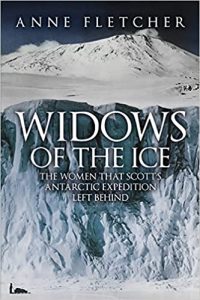WIDOWS OF THE ICE The women that Scott’s Antarctic Expedition left behind
WIDOWS OF THE ICE
The women that Scott’s Antarctic Expedition left behind
 The idea for this book came while I was on holiday in Sicily. Thinking about the history of Britain that I was taught during the 1970s and 80s, I was reflecting that behind every great man and every great event there must have been wives, children and families left to pick up the pieces of their famous and heroic exploits. These wives, often widows, had to worry about all the domestic details of life – feeding their children, keeping a home going and earning money while the rest of the world thrilled at the stories of their husbands, men now consigned to the history books. I wondered what the women who shared a life with Admiral Nelson, the men of the Light Brigade and of course Captain Scott really thought of their husbands’ sacrifice. I wondered too if putting the women back into a well-known story would change the narrative.
The idea for this book came while I was on holiday in Sicily. Thinking about the history of Britain that I was taught during the 1970s and 80s, I was reflecting that behind every great man and every great event there must have been wives, children and families left to pick up the pieces of their famous and heroic exploits. These wives, often widows, had to worry about all the domestic details of life – feeding their children, keeping a home going and earning money while the rest of the world thrilled at the stories of their husbands, men now consigned to the history books. I wondered what the women who shared a life with Admiral Nelson, the men of the Light Brigade and of course Captain Scott really thought of their husbands’ sacrifice. I wondered too if putting the women back into a well-known story would change the narrative.
On 10 February 1913 the news of the death of ‘Scott of the Antarctic’ broke around the world. The tragedy was on every front page and column inches thrilled at the story of how the five gallant polar explorers, beaten to the South Pole, had perished on their way home. It was reported that as Captain Scott lay freezing and starving to death, he had written with a stub of pencil his final words: ‘For God’s sake look after our people.’ Uppermost in his mind were the three women who would now be widows: Kathleen, his own bohemian, artist wife; Oriana Wilson the devout wife of the expedition’s chief scientist Ted Wilson and Lois Evans, the Welsh, working class wife of Petty Officer Edgar Evans.
Despite the great efforts of the expedition’s members, the women who loved these men most were the last to know of their deaths. Kathleen was at sea on her way to a reunion with Scott in New Zealand and Oriana, already in the country, heard the news from a newspaper hawker as she arrived by train into Christchurch to meet Ted. When the news broke and the widows became a focus of press coverage, these two women were afforded a certain amount of protection by their status and by their influential friends who guaranteed them some privacy.
Lois however experienced the worst of it. She was the only one still in the UK and was left unshielded from the very worst form of press intrusion. She was tracked down in the wilds of Wales and doorstepped by journalists. Her children, who did not yet know that their father was dead, were photographed on their way home from school. She was forced too to defend Edgar when the finger of blame was pointed at him, fuelled by the popular belief that the working classes were physically and mentally weaker and that if he had not slowed them down then perhaps the four ‘English gentlemen’, might have got home safely.
It was an accusation that coloured not only Lois’s life but those of her children too as they were bullied mercilessly at school. When millions of pounds were raised in a public appeal, money was awarded to the widows according to their rank and status. Lois, who needed the most, received the least. She had accepted a financial risk when Edgar joined the expedition and left the Naval pay roll. When the expedition had run into financial difficulties and salaries were not paid, she had had no choice but to take her three children home to Wales to subsist there with her family. Despite the money raised by the public, Lois was left to struggle financially for the rest of her life.
These three women, with little in common except for their husbands’ deaths, found their futures shaped by the tragedy, but it would be Kathleen Scott who would find it hardest to escape its shadow. She became a celebrity in her own right. Like the wives of the American astronauts of the 1960s who were briefed to reply to any press question with ‘ I’m thrilled, proud and happy’ Kathleen kept her upper lip stiff and repeated the mantra that her husband died bravely and that she was proud. She did the job so well that her closest friend, the writer George Bernard Shaw, believed that she had not loved Scott and felt no pain.
This was far from the truth and there were many nights and many years of crying into her pillow. As a high profile widow Kathleen’s situation sparked a world-wide interest in whether she would marry again. Reports of weddings with various bride grooms, including Peter Pan’s creator JM Barrie appeared in the newspapers and as in the case of Jaqueline Kennedy, decades later, there would be mixed feelings about whether a hero’s wife should ever marry another man.
Widows of the Ice is not the story of famous women but of forgotten wives who helped to shape one of the most iconic moments in British history. Kathleen, Oriana and Lois have now drifted to the outer edges of the Antarctic narrative but bringing them back gives a new perspective to a story we thought we already knew. It also gives us a deeper understanding of what it was like to be an Edwardian woman navigating a fraught destiny. It is a story of imperialistic dreams, misogyny and classism, but also of enormous courage, high ideals, duty – and, above all, love.
—
Anne Fletcher is a writer and a historian. She has worked in heritage for thirty years at some of the most exciting historic sites in the UK including Hampton Court Palace, St Paul’s Cathedral, Buckingham Palace, Westminster Abbey, Bletchley Park and Tower Bridge. She is a member of both the Biographers’ Club and the Historical Writers’ Association.
To find out more or contact Anne:
https://linktr.ee/annefletcher
Twitter: @Annecfletcher
Widows of the Ice: The women that Scott’s Antarctic Expedition left behind
 A moving and original account of the effect of Scott’s tragic expedition on the men’s wives and families, who fame and history have overlooked.
A moving and original account of the effect of Scott’s tragic expedition on the men’s wives and families, who fame and history have overlooked.
This story begins with perhaps one of the most iconic moments in British history: the death of Scott of the Antarctic. But it continues where previous histories have stopped. Unlike other books about the famous expedition, which has become such a powerful symbol of heroic failure and British bravery, Widows of the Ice examines the rest of the human story. Uniquely, it shows how the expedition affected the people closest to its members, beyond the British public who came to lionize them. These were the wives and families left behind by their brave, dead men.
As Scott wrote in his last letter, ‘I do not regret this journey, which has shown that Englishmen can endure hardships, help one another and meet death with as great a fortitude as ever in the past.’
But what was behind this extraordinary type of bravery, where death sometimes seemed more honorable than success? And how much did those who loved and depended on the explorers support their endeavors, when it meant that they could lose everything?
Widows of the Ice not only provides a fascinating new account of one of modern British history’s best-known events – a story that we thought we knew – but also sheds light on the culture that drove men to risk themselves in faraway lands, to inflict fear and loss of their families, which was an essential ingredient in the values of the British Empire and the nation’s sense of identity until surprisingly recent times.
With reference to original sources including personal diaries and letters, Widows of the Ice puts a human face to the Scot Expedition, and shows how the women left behind by their heroic husbands suffered and survived, unable to express their sadness in a country that venerated their husbands’ sacrifices.
BUY HERE
Category: On Writing
























